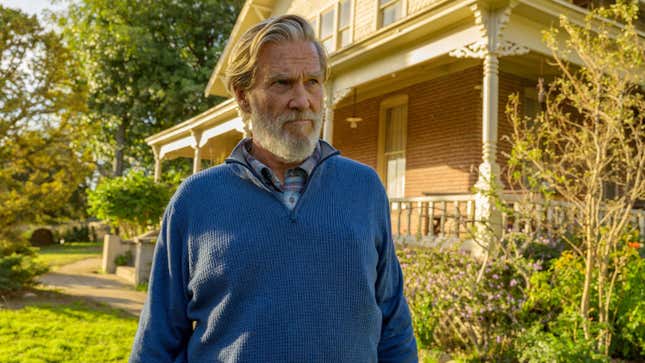
There is an old storytelling rule that when it comes to books or movies, nobody poops. A bathroom trip is a violation of Chekhov’s gun principle, wherein all details must contribute to the overall narrative. Also, nobody wants to see that shit. Yet The Old Man opens with Jeff Bridges’ character going to relieve himself not once but three times during a single night. He’s an old man, after all, as the show keeps reminding us. At one point, an assailant says, “Fuck you, old man” in the middle of a knife fight; and just moments later, another derides “getting shook by a senior citizen.” It almost seems cruel, given Bridges’ recent personal history: An extended battle with COVID while on chemotherapy for lymphoma left him “pretty close to dying” last year. (Production was halted at the start of the pandemic and then again after Bridges’ diagnosis.)
Or, it might seem cruel, if not for the 72-year-old’s never-erring aura of Dude-like amused detachment. Bridges has the aged gravitas of a character in a Tom Waits song, the sort of guy who’s about to talk wistfully about all the cars he’s had in his life. In fact, it looks like Bridges borrowed Waits’ beard from The Ballad Of Buster Scruggs. It is well fit for the weathered weight of the character, Dan Chase, who grumbles through dad jokes with the doctor, dad jokes with a waitress over reading spectacles, and dad jokes with a first date. Chase has the kind of old-timer grace that lets him find the perfect Robert Plant banger on the radio when said date can’t get the bluetooth to work.
But Dan Chase is not your father’s father. He’s a former CIA operative whose serenity in Connecticut is blown apart by a midnight hitman, one who Chase is alerted to not by SimpliSafe or ADT, of course, but by a DIY alarm of empty dog-food cans on a string. And just like that, his cover is crumpled and he’s on the run from his former bosses and his past, relying on old skills despite being told, “You have no idea how different the game is than the last time you played” and “You aren’t the guy you remember.” It is a plot so entrenched in the present-day Liam Neeson oeuvre that there may be royalties due. There’s even a threatened daughter, brought into peril precisely because of Chase’s unique set of skills. He is a man comfortable with unsettling fits of incredible and explosive violence, natural looking in intimate hand-to-hand combat shots so brutal and relentless that they might make pacifists wonder, “What is it, exactly, that CIA guys learn? Are they schooled on Steven Seagal flicks?”
If this all sounds familiar, it is. The premise feels like the stuff of a slick Soderbergh-esque 90-minute-er or a subdued spy thriller or something in the vein of the George Clooney vehicle The American. It’s stylish from the jump, with smart opening credits, a thoughtfully ruminating score, a continuously deep attention to framing, and an A-list cast. Yet the backstory begins to feel padded by episode two as talk turns to “Langley,” as if that place were an entity itself, and the show begins to run against the tropes of Tom Clancy. Expensive suits pass each other official-looking manila folders, furrowing brows, doing the serious business of bureaucracy under the guise of protecting American freedom, or something.
But it’s a story most concerned with the past. Flashbacks and exposition-filling phone conversations and voicemails increasingly come into play, often too-neatly filling in narrative gaps and sometimes leading to Shakespearean soliloquies from Chase’s daughter that sound nothing at all like a thirtysomething talking to her father. It’s also a ghost story in a less metaphoric way, as Chase’s deceased wife, Abbey, drops by as a specter chilling enough to feel almost like a character in an entirely different show. John Lithgow plays Harold Harper, an FBI honcho and former CIA honcho with the pinched and condescending face of a high school chemistry teacher who is haunted by sordid entanglements in the mountains of Afghanistan. Alia Shawkat, maybe miscast—it’s hard to see her aligning herself with The Man—portrays his tenacious, loyal understudy. Amy Brenneman takes on Zoe, the show’s quiet but sturdy conscience, a reluctant landlord of Chase who becomes romantically entangled with his trajectory. This course leads to tangents west and points unknown, with increasingly jarring whiplash snaps in tension.
But The Old Man, like an old man, is best when it ambles with a contemplative pace. Bill Heck admirably plays a young Chase during the bloody backstory set in Jack Ryan territory, but it always feels good getting back to spending time with Bridges. Especially in the quiet moments of chopping onions or making bulletproof coffee or slowly backing off to give space to someone he has intimidated or talking, as he often does, to his brilliant and brutal Rottweilers, Dave and Carol. There is something redemptive in watching him drum his fingers with wry satisfaction as he pushes a plate of food across a counter. It’s moving, in a way, to see him doing the human business of arriving, everyday, full of reflection. Sometimes there’s a man, working on life despite it all.
The year after he broke out in 1971’s The Last Picture Show, Bridges co-starred with Stacy Keach in John Huston’s vastly underrated Fat City. The last scene finds the two boxers, at opposite ends of their careers, sipping cups of cafeteria coffee, both still beaten up, beaten down, bruised and beleaguered, huddled and hunkered, and almost desperate. Keach’s character sympathetically considers an elderly waiter: “You think he was ever young once?” Bridges takes a perfect beat before replying: “No.”